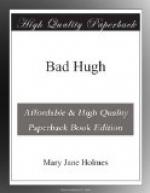The room was cleared of all its canine occupants, save Kelpie, who Hugh insisted should remain, the mother resumed her knitting, and Adaline her book, while Hugh sat down before the blazing fire, and, with his hands crossed above his head, went on into a reverie, the nature of which his mother, who was watching him, could not guess; and when at last she asked of what he was thinking so intently, he made her no reply. He could hardly have told himself, so varied were the thoughts crowding upon his brain that wintry night. Now they were of the eccentric old man, who had been to him a father, and from whom he had received Spring Bank, together with the many peculiar ideas which made him the strange, odd creature he was, a puzzle and a mystery to his own sex, and a kind of terror to the female portion of the neighborhood, who looked upon him as a woman-hater, and avoided or coveted his not altogether disagreeable society, just as their fancy dictated. For years the old man and the boy had lived together alone in that great, lonely house, enjoying vastly the freedom from all restraint, the liberty of turning the parlors into kennels if they chose, and converting the upper rooms into a hay-loft, if they would. No white woman was ever seen upon the premises, unless she came as a beggar, when some new gown, or surplice, or organ, or chandelier, was needed for the pretty little church, lifting its modest spire so unobtrusively among the forest trees, not very far from Spring Bank. John Stanley didn’t believe in churches; nor gowns, nor organs, nor women, but he was proverbially liberal, and so the fair ones of Glen’s Creek neighborhood ventured into his den, finding it much pleasanter to do so after the handsome, dark-haired boy came to live with him; for about that frank, outspoken boy there was then something very attractive to the little girls, while their mothers pitied him, wondering why he had been permitted to come there, and watching for the change in him, which was sure to ensue.
Not all at once did Hugh conform to the customs of his uncle’s household, and at first there often came over him a longing for something different, a yearning for the refinements of his early home among the Northern hills, and a wish to infuse into Chloe, the colored housekeeper, some of his mother’s neatness. But a few attempts at reform had taught him how futile was the effort, Aunt Chloe always meeting him with the argument:
“‘Taint no use, Mr. Hugh. A nigger’s a nigger; and I spec’ ef you’re to talk to me till you was hoarse ‘bout your Yankee ways of scrubbin’, and sweepin’, and moppin’ with a broom, I shouldn’t be an atomer white-folksey than I is now. Besides Mas’r John, wouldn’t bar no finery; he’s only happy when the truck is mighty nigh a foot thick, and his things is lyin’ round loose and handy.”




